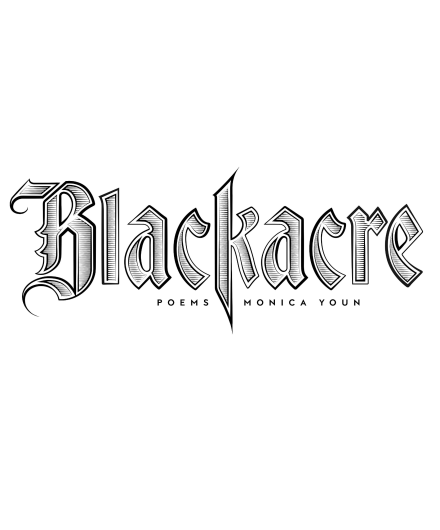Putting Everyday Words Into a Nuclear Reactor
The title of Monica Youn's new poetry collection, Blackacre, refers to a legal term dating back to 1628. In celebration of its publication, we're thrilled to share her essay on why the roots of language matter.
There’s a classic plot twist—call it the “tech-spec reveal”—that shows up in a certain type of story—Ghostbusters, CSI, Neuromancer, Iron Man, Pokémon Go. A character looks out at the world through some kind of enhanced lenses, and startlingly new aspects of reality burst into our awareness—ectoplasmic spectres, bloodstains, a flaming fox avatar on the floor of the RNC. The frisson comes from the friction of familiarity and strangeness, intimacy and alienation: “I see this everyday, I just touched it, it’s right next to me, but I had no idea that _______.”
Etymology offers a similar thrill. To hear about someone’s cataract surgery, and to know that kataraktes in Greek means “portcullis” as well as “waterfall,” is to see a pair of eyes through a spiked iron grillwork, and then to see that gridded barrier being lifted laboriously away.
It’s a dream of enhanced reality, language as hypertext. I remember first having that dream prior to the Internet (yes, I am that old), in grad school, working my way – at a rate of a page per hour—through Roland McHugh’s Annotations to Finnegan’s Wake.
I remember thinking it was like putting everyday words into a nuclear reactor—seeing the language swell, spawn, self-replicate before your very eyes. (The late and much-lamented genius.com version of The Waste Land used to give a similar thrill, but it’s sadly fallen prey to Faber & Faber’s copyright goons.)
But there’s an inevitable power play about such hidden knowledge, thus deployed. Etymology—the roots of language—should amount to more than a Sherlock-style game of one-upmanship. Etymology brings home to us that, as language artists, our medium is entirely human-made, that—unlike artists who work with pigments or pixels or sound waves or light waves or metal or wood or stone—we can never pretend to abstract ourselves from history, from politics. To use a word without knowing its history can be nearly as blameworthy as living in a nation without knowing its history.
Even a seemingly innocuous bit of etymological trivia—that “pork” has a Latinate root, while “pig” has a Germanic root—unpacks into a narrative of blood, class, and ethnicity: the Norman Conquest and occupation. As James Longenbach points out, “Even today, we raise pigs and cows (from German, via Old English) but eat pork and beef (from Latin, via French), because after the Norman conquest the peasants who raised animals generally spoke English while the noblemen who ate them spoke French.” The choice between two monosyllabic p-words about swine ends up requiring the writer to choose sides between landholder and vassal, colonizer and colonized.
I trace my own poetic fascination with etymology to Seamus Heaney, via my teacher Paul Muldoon. Heaney was perhaps the great poetic etymologist of our time, calling etymology “a symptom of human history, memory and attachments.” In “Broagh” and a slew of other poems he uses etymology as a trope for historical culpability, upending facile binaries between “we” and “they.” Although the speaker of “Broagh” would like to differentiate between those locals who can correctly pronounce the word and “the strangers,” Heaney himself pointed out that such a distinction is untenable since “Protestant and Catholic and both say it perfectly in this part of the world.”
And, of course, words don’t just have roots – after they emerge into existence, they continue to accumulate meanings, like rings around a tree. So generations of readers have been unable to treat parsley as an innocuous garnish after reading Rita Dove’s iconic poem. And Joy Katz creates a chilling, unforgettable poem about encountering the word “holocaust” in the 1935 edition of her mother’s dictionary.
In Old English law, a deodand was an object that had brought about a person’s death—a tree branch, a horse, a haystack. Such deodands were forfeit to the Crown, to be sold or destroyed. But what happens when a word is such an instrumentality? To pick just one example, if an otherwise innocuous word is used as a racist weapon, can it ever be redeemed?
As a lawyer I learned that the concept of the “common law” meant that every use of a particular word or phrase—“person,” “due process of law,” “cruel and unusual punishment”—is subject to every other case law use of that word or phrase; that such words and phrases roll through history amassing meanings, layers, resonances, associations. As a lawyer, my job was to try to freeze, to fix, to pin down these unwieldy agglomerations into a reasonable degree of certainty, so that they could function as frameworks, as roads and bridges, as fences and prisons.
As a poet, my job, as I see it, is to destabilize, to emphasize the contingent, the artifactual, to play on sonic and semantic resonances until they shake the whole rickety structure to pieces, then to pick up the pieces and start again. To share a common language means that the tools that we use, the media that we mold, are constantly, fabulously morphing in our hands, that each linguistic act is a contingent collaboration with every other user of the language—present, past, and future.
Monica Youn is the author of two previous poetry collections, Barter and Ignatz, which was a finalist for the National Book Award. A former lawyer, she teaches at Princeton University and in the MFA Program for Writers at Warren Wilson College.
